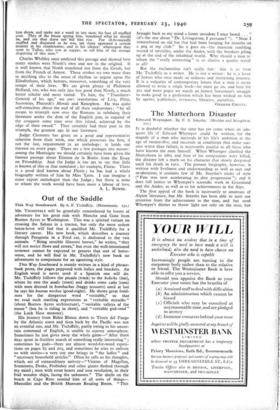Out of the Saddle
This, Way Southward. By A. F. Tschiffely. (Heinemann. 15s.)
Mn. TSC.HIFFELY will be gratefully remembered by lovers of adventure for his great ride with Mancha and Gate from Buenos Ayres to Washington. This. was a spirited variant on crossing the Sahara in a tractor, but only the most ardent horse-lover will feel that it qualified. Mr. Tschiffely for a literary career. His new book, which describes a journey through Patagonia in a: Ford car, is dedicated to the two animals: " Being sensible illiterate horses," he writes, " they will not notice flaws and errors," but even the well-intentioned reviewer cannot be expected to possess that sort of horse- sense, and he will find in. Mr. Tschiffely's new book no adventures to compensate for an agonising style.
This Way Southward is mainly written in a kind of phrase- book prose, the pages peppered with italics and brackets. An English word is never used if a Spanish one will do. Mr. Tschiffely follows the picada. (track) to, the boliche (inn), where he eats the asado (roast) and drinks some caplet (rum) with men dressed in bombachas (baggy trousers) until at last he says his buenas noches (good-night). He shows great fond- ness for the dangerous word " veritable," so that we read such startling expressions as " veritable miracles " (about Buenos Ayres architecture), " veritable valleys of the moon" (but he is riding in them), and " veritable god-send " (the Loch Ness monster).
His journey from Bahia Blanca down to Tierra del Fuego by the Atlantic coast and then back by the Pacific was not an. eventful one, and Mr. Tschiffely, partly owing to his 'uncer- tain command of English, is unable to convey atmosphere. Sometimes he just gives away the whole game—" After three days spent in fruitless search of something really interesting "; sometimes he pads—there are almost word-for-word repeti- tions on pages 83 and 215, and sometimes he tries to enliven us with stories. -a very coy one brings in " the ladies " and " necessary household articles." Often he tells us his thoughts, which, are of extraordinary naivety—" Visions of Magellan, Sormiento„ Drake, Frobisher and other giants flashed through my mind ; men with stout hearts and iron resolution, in their frail wooden ships, facing the unknown." The shells on the beach at Cape Raso remind him of all sorts of things- Mussolini and the British Museum Reading Room. "This broUght back to my mind a funny anecdote I once heard .. . " (it's the one about " Dr. Livingstone, I presume? "). " Next I remembered an old hat that had been hanging for months on a peg at my club." So it goes on—the innocent rambling record of triviality, under the Andes, with the breakers piling up at the end of the inhabited world. Why should a man to whom the " really interesting " is so elusive a quality travel at all?
But the exclamation isn't really fair : this is to treat Mr. Tschiffely as a writer. He is not a writer : he is a lover of horses who once made an arduous and interesting journey. It is a vulgarity of contemporary letters that a man is never allowed to write a single book—he must go on., and here for Soo and more pages we watch an honest horseman's struggle to make good in a profession which has been wished on him by agents, publishers, reviewers, libraries, ourselves.
GRAHAM GREENE.






































 Previous page
Previous page